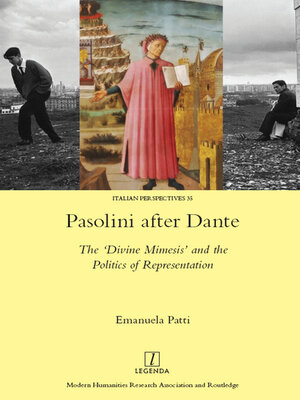Pasolini after Dante
ebook ∣ The 'Divine Mimesis' and the Politics of Representation · Legenda
By Emanuela Patti

Sign up to save your library
With an OverDrive account, you can save your favorite libraries for at-a-glance information about availability. Find out more about OverDrive accounts.
Find this title in Libby, the library reading app by OverDrive.



Search for a digital library with this title
Title found at these libraries:
| Library Name | Distance |
|---|---|
| Loading... |
What role did Dante play in the work of Pier Paolo Pasolini (1922-1975)? His unfinished and fragmented imitation of the Comedia, La Divina Mimesis, is only one outward sign of what was a sustained dialogue with Dante on representation begun in the early 1950s. During this period, the philologists Gianfranco Contini (1912-1990) and Erich Auerbach (1892-1957) played a crucial role in Pasolini's re-thinking of 'represented reality', suggesting Dante as the best literary, authorial and political model for a generation of postwar Italian writers. This emerged first as 'Dantean realism' in Pasolini's prose and poetry, after Contini's interpretation of Dante and of his plurilingualism, and then as 'figural realism' in his cinema, after Auerbach's concepts of Dante's figura and 'mingling of styles'. Following the evolution of Pasolini's mimetic ideal from these formative influences through to La Divina Mimesis, Emanuela Patti explores Pasolini's politics of representation in relation to the 'national-popular', the 'questione della lingua' and the Italian post-war debates on neorealism, while also providing a new interpretation of some of his major literary and cinematic works.







